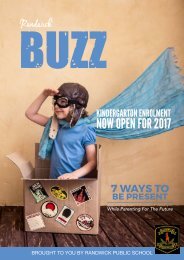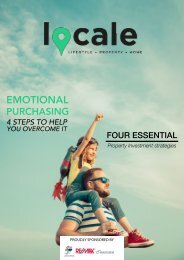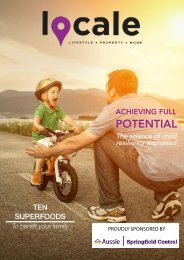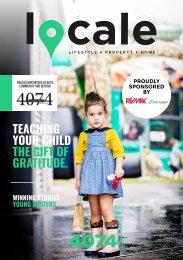SCOOP - TERM 2016
Create successful ePaper yourself
Turn your PDF publications into a flip-book with our unique Google optimized e-Paper software.
BROUGHT TO YOU BY DOUBLE BAY PUBLIC SCHOOL P&C
P&C<br />
President’s Report<br />
Welcome to the first edition of <strong>SCOOP</strong>! for <strong>2016</strong>!<br />
Term 2 has been busy and exciting!<br />
The Mothers Day Breakfast was a highlight for the P&C with Fiona, Rea and Caroline<br />
co-ordinating what was a lovely morning for mothers and children, and a huge success<br />
for P&C fundraising. Thank you for your support of this terrific event!<br />
The long awaited sunshade should be up over the next few weeks. We have had a<br />
couple of issues to finalise through Council and feel positive they should be resolved<br />
very shortly.<br />
DATES for the DIARY:<br />
Election Day Stalls: We look forward to a fun day on Saturday 2nd July. Please<br />
come to school to vote and enjoy the activities on offer: face painting, jumping castle,<br />
cake stall, White Elephant stall, sausage sizzle and coffee cart.<br />
We need your CAKE DONATIONS on Friday 1st July - please drop them to the front<br />
office.<br />
DBPS Band & Choir Night: The school Bands and Choirs will be peforming on<br />
Thurs 30th June 6pm, at Ascham School, together with Glenmore Road Public School.<br />
The Bands and Choirs have been practising very hard, and it will be a wonderful night.<br />
Garden Working Bee: please put Sunday 7th August in your diary for the<br />
Garden Working Bee at school. We need as many volunteers as possible!<br />
Thank you: to Nicole Westbury who is doing a wonderful job leading fundraising<br />
for the P&C<br />
Next P&C Meeting: Wed 27th July, 6pm Everyone is welcome, please come along<br />
and be involved!<br />
The P&C wish everyone a safe, happy and relaxing holiday,<br />
Best Wishes,<br />
Georgia Powell<br />
P&C President
What Parents Need to Know about Aussie Teenagers:<br />
10 ways to help your kids thrive<br />
4<br />
Pornography, peer pressure, perfectionism to<br />
conform to social media, split families, self-harm,<br />
parental pressure to succeed, cyber bullying<br />
and gaming are all concerns of teenagers today,<br />
according to the ABC 4Corners documentary Our<br />
Kids.<br />
In a telling episode, Australian kids from the age of 12<br />
year to 19 years shared a glimpse of their inner world and<br />
what their hopes, fears and dreams are for the future.<br />
While many of the concerns are not dissimilar to<br />
previous generation of teenagers, the explosion<br />
of social media has expanded the horizons of our<br />
teenagers and is having a dire impact on their selfimage,<br />
increased exposure to world events such as<br />
terrorism and over use of technology.<br />
Cyber bullying is wreaking havoc with teenage<br />
girls as well as the pressure to conform to the<br />
perfection that girls are seeing their friends on<br />
Instagram, Snapchat or Tumblr. A twelve year old<br />
girl in the program told of her need to belong to<br />
the ‘in group’ and used social media to compare<br />
herself to others – to make sure she had the latest<br />
white converse, the triangle bikini and Marc Jacob<br />
jeans and watch.<br />
Another concern for teenagers was the added<br />
pressure of parents wanting their kids to do well<br />
at school. These kids were concerned that their<br />
parents are putting huge, unnecessary pressure on<br />
kids to succeed at school as well as to participate<br />
in an ever increasing amount of extracurricular<br />
activities and tutoring. One girl talked about how<br />
she was in the top maths group but her mum<br />
doubted her. ‘I’m going to fail every test according<br />
to mum’.<br />
An alarming statistic in the program revealed that<br />
30 per cent of 11-17 year old boys spend up to<br />
3 hours a day gaming – more on weekends and<br />
it is affecting boys ability to use their time well.<br />
One boy said ‘I don’t have time for homework’.<br />
They are mostly playing the game ‘call of duty’<br />
against each other in virtual online worlds and<br />
while gaming can have positive ramifications to<br />
help kids think outside the box, problem solve<br />
and build a community, there needs to be strong<br />
boundaries and rules in place from the parents<br />
to balance it with other activities, including<br />
homework and sport.<br />
The major concern for this age group, especially<br />
among girls is the widespread use of self-harm.<br />
Self-harm is dubbed the ‘new anorexia’ and<br />
scarily enough this age group do not see it as<br />
dysfunctional because it is so rife. Around 135,000<br />
kids have self-harmed this past year. It is strongly<br />
related to poor mental health and can take its toll<br />
on all aspects of the teenager’s life.<br />
Mental health in our teenagers today is at an alltime<br />
low with one in four teens currently have<br />
a mental health condition (including anxiety,<br />
depression and substance abuse) and a quarter<br />
also saying they are unhappy with their lives.<br />
Access to pornography is altering the view boys<br />
have of girls. By the age of 10, every boy will have<br />
seen porn online and this is impacting on sexual<br />
relationships and intimacy between boys and girls.<br />
The common thread throughout the episode that<br />
relieved stresses and pressures in teenager’s lives<br />
was physical activity and strong relationships.<br />
So what role can parents play in the lives of their children<br />
to ensure they thrive though the teenage years?<br />
1. Start early<br />
By the time your child is a teenager, you have<br />
already sown the seeds of independence,<br />
love, trust, respect, good mental health,<br />
resilience, confidence, self-esteem and habits<br />
around technology. You have already built<br />
your relationship and while none of these are<br />
irreparable with a teenagers, they are easier to<br />
develop from the moment our children are born,<br />
than to suddenly input when your children are<br />
teenagers.<br />
2. Build a solid relationship from the start<br />
Extensive and widespread research shows that<br />
building a strong parent-child bond early is the<br />
number one factor to raising a resilient child.<br />
When a child feels loved, nurtured and a sense<br />
of significance and belonging from just one<br />
adult (ideally a parent or parent figure), they<br />
have stronger mechanisms to bounce back from<br />
adverse situations than their counterparts who<br />
have formed negative or no relationships with an<br />
adult and to make good decisions. The relationship<br />
starts the very moment you hold your child in your<br />
arms and it looks at you. Right from that moment,<br />
you are forming an important bond that will last<br />
a lifetime. Like any relationship, it needs to be<br />
nurtured and effort needs to be fed into it to make<br />
it work. One on one time is important, speaking<br />
respectfully, building the relationships on love and<br />
cuddles, creating micro moments of connection<br />
and acknowledging how special your child is<br />
to you, are all important in building a strong<br />
relationships.
3. Set clear boundaries and expectations<br />
Just like adults, children are creatures of habit and<br />
love to follow rules when they are young. If you<br />
can set clear boundaries and expectations early,<br />
they will know exactly where they stand with you<br />
and in their environment. You will help them make<br />
sense of the world around them, form good habits<br />
and ideally make good choices when faced with<br />
everyday problems. When you set the boundaries<br />
and expectations, be consistent. Follow through on<br />
what you say and let your child feel safe and secure<br />
in their environment with you.<br />
4. Be the role model<br />
As a parent, you are your child’s first role model.<br />
If you have watched your children closely for a<br />
few hours or listened to them speak, you will hear<br />
and see snippets of your most common sayings<br />
or mannerism come out in their play time or voice<br />
as they mimic you. Provide your child with an<br />
environment and role model that is upbeat and<br />
gives your child hope and a positive attitude to<br />
move through their day. Young children react to<br />
whatever mood or state of mind you are in. If you<br />
are always stressed and in a hurry, they will pick<br />
up the vibe and develop a similar habit. Take time<br />
to stop and be with your kids. Have fun with them<br />
at the park or at the beach. Take them on nature<br />
walks. Think of who you needed around you when<br />
you were a child and be that person.<br />
5. Meet children in the moment<br />
Children live in the moment so meet them there.<br />
Don’t overload them with your own stresses and<br />
worries we carry with us as adults, both past and<br />
present. A child’s biggest concern in their day are<br />
generally meeting their own basic needs – food,<br />
water, sleep, safety and love. Meet your kids there.<br />
6. Don’t over catastrophize the situation<br />
The part of the child’s brain that deals with<br />
emotions and rational decision making is<br />
underdeveloped. The prefrontal cortex doesn’t<br />
fully develop until the age of 22. However, as adults<br />
we already have a fully functioning rational brain.<br />
We need to use our skills to calm a situation down<br />
and don’t over catastrophize it. Because of an<br />
underdeveloped brain as a child, their response is<br />
irrational and so through words, actions and role<br />
modelling we can use our rational brain to invoke<br />
calm and coping strategies for certain situations<br />
that doesn’t result in a full blown catastrophe.<br />
7. Let children experience disappointment<br />
Our natural propensity as a parent is the ‘fix’.<br />
However, if we continue to fix every disappointment<br />
our child faces, they are not going to develop their<br />
own strategies to cope with the ups and downs<br />
of life and the disappointment that results from<br />
that. So ‘be’ with your child when they experience<br />
disappointment and tell them how much is sux that<br />
they didn’t get into the cricket team or the choir.<br />
Problem solve ways to help them get over it.<br />
8. Recognise emotions and strategies to deal with them<br />
By helping a child recognise their own emotions<br />
and develop strategies to deal with them, we are<br />
allowing them to again navigate the ups and downs<br />
of life. The big emotions that press parent’s buttons<br />
are anger, frustration and sadness that generally<br />
result in an emotional outburst in some form from<br />
our child. Let your child experience these emotions,<br />
name them and put strategies in place to deal with<br />
them. Assure your child it is OK if they feel these<br />
emotions as long as they know how to move on<br />
from them.<br />
9. Shape a positive inner critic<br />
For good mental health, we need to help our<br />
children develop a positive inner critic. They<br />
need to be self-confident and self-assured to<br />
back themselves in difficult situations and to<br />
make good choices. By teaching our children<br />
to love themselves and be kind to themselves,<br />
we are setting them up for being able to deal<br />
with setbacks, making mistakes and failure. To<br />
encourage self-confidence, our children need to<br />
feel a sense of significance. Let them perform that<br />
dance concert with bad dance moves and terrible<br />
music. Let them experience new things and take<br />
risks. Let them say no and assert themselves and<br />
learn from that experience. And use positive selftalk<br />
yourself – don’t criticize yourself in front of<br />
your children.<br />
10. Discipline with respect and love<br />
Every children will need discipline at some point<br />
and some more than others. When you are<br />
disciplining your child, remember it is the behaviour<br />
you are correcting – not the child. Don’t shame<br />
them or criticize them as a person. Speak to your<br />
child like you would talk to your best friend or your<br />
work colleague – with respect. Give lots of cuddles<br />
and use discipline as a teachable moment to learn<br />
from rather than a time to berate or shame.<br />
Anna Partridge is a Parent Education, School Teacher and Mother to<br />
3 kids. She is passionate about working with families to help them<br />
raise confident and resilient children.<br />
http://www.annapartridge.com<br />
About Anna:<br />
Anna Partridge is<br />
a certified Positive<br />
Discipline Parent<br />
Educator, a school<br />
teacher and a mother to<br />
three highly spirited, beautiful children. She<br />
loves nothing more than helping parents<br />
raise resilient and confident children, build<br />
strong and connected family relationships<br />
and strive for calm, fun and happy families.<br />
http: /annapartridge.com/
R&W DOUBLE BAY<br />
DATE MARKET WRAP UP<br />
by James Dunn R&W Double Bay<br />
Double Bay Public School Newsletter<br />
June <strong>2016</strong><br />
Here we are wrapping up the first half of<br />
<strong>2016</strong>………… it’s hard to believe, that we<br />
are already half way through the calendar<br />
year.<br />
What an interesting year it’s been, council<br />
amalgamations, federal election and the<br />
Brexit referendum. Despite any negative<br />
commentary around any of these local and<br />
global influencers the real estate market<br />
continues its upward trend.<br />
The Core Logic May Home Value Index<br />
reported a 1.6% rise in capital city dwelling<br />
values over the month, taking values 5.0%<br />
higher of the calendar year to date. The<br />
strong May numbers were largely the result<br />
of a surge in Sydney dwelling values which<br />
were up 3.1% over the month. A rise in all<br />
other capital cities except for Perth were<br />
recorded.<br />
After such a strong performance across the<br />
Sydney housing market, the annual rate of<br />
growth has moved substantially higher to<br />
reach 13.1% per annum.<br />
The local real estate market has definitely<br />
been the classic scenario of low supply and<br />
high demand leading to strong results in all<br />
sectors of residential homes and units. Our<br />
auction results for the year have run at 92%<br />
success rate with the past three months<br />
seeing a 100% results in either under the<br />
hammer sales or sold prior to the auction.<br />
We are finding buyers very keen to secure a<br />
home before it “gets to market” and have<br />
made 20% of sales from our database of<br />
qualified buyers. Buyers are keenly coming<br />
forward with strong pre-auction offers and<br />
this has resulted in a lot of quick sales and<br />
great results for our vendors.<br />
Those properties that have gone to auction<br />
have indeed been competitive and bold<br />
biding showing the determination of buyers<br />
to secure the prize! Of course there has also<br />
been quite a lot of activity with off shore<br />
interest, but generally we have found that<br />
the majority of the sales are to local buyers.<br />
We are very pleased to say that one of the<br />
Double Bay families bought a beautiful<br />
renovated family home though us in a very<br />
competitive auction recently and we are sure<br />
they are very excited about moving in soon.<br />
At the welcome cocktail party earlier in the<br />
year we are happy to have donated a further<br />
two Ipads to the lucky winner and we look<br />
forward to a further donation of another<br />
Ipad with the Art competition coming up<br />
next month.<br />
Last week the team of Directors from our<br />
office and our partners enjoyed the spoil<br />
of Manu cooking us dinner at home having<br />
purchased the prize at the school Studio 54<br />
fundraiser almost two years ago. Yes, it’s<br />
a long time ago but it has taken this long<br />
for us and Manu to get a time that worked<br />
R&W<br />
together. But let me tell you, it was worth<br />
the wait. A fun night, he is not only a great<br />
chef, but very entertaining. A memorable<br />
experience.<br />
So now we get ready for the winter months,<br />
but we are not hibernating, rather we are<br />
enjoying the chance to communicate more<br />
with our buyers, landlords and sellers and<br />
preparing for the Spring. If you are selling,<br />
don’t think you have to wait for the Spring,<br />
as in winter months there is less competition<br />
and still the need for people to buy property,<br />
whether for investment, upsizing or<br />
downsizing, inclement weather doesn’t stop<br />
the need. Call me if you would like to catch<br />
up for a coffee and need some real estate<br />
advice.<br />
James Dunn<br />
Partner<br />
Richardson & Wrench Double Bay<br />
6
Parking<br />
Parents/Caregivers must obey the parking<br />
restrictions that are in place around the school.<br />
They are there for the safety of the children. It<br />
is particularly important when the sport buses<br />
return and have to off-load 60 children safely.<br />
It is very dangerous if cars are parked in the<br />
bus zones. Most parents are very mindful of<br />
the situation and we are appreciative of their<br />
cooperation. Parents/caregivers must not park<br />
over residents’ driveways when dropping off and<br />
picking up children. Under no circumstances<br />
are parents/caregivers allowed to park in the<br />
school grounds. Parents and students must not<br />
enter or exit the school grounds via the school<br />
car park. I would like to remind parents/<br />
caregivers that you MUST NOT STOP in the<br />
bus zone outside the school when dropping<br />
off or picking up your children. This can incur<br />
a fine. Parents are reminded that the ‘Drop off<br />
Area’ is only a ‘Drop off Area’ – you cannot<br />
park there. Please view and take note of the<br />
map below:<br />
DOUBLE BAY PUBLIC SCHOOL PARKING PLAN <br />
This plan is the quickest, most efficient way for us to pick up. <br />
Please remember – MOVE ON quickly, DO NOT double park, DO NOT park in the bus zone, WALK if you live close! <br />
¥ Circulate around the block if you can’t get a park straight away. <br />
¥ William Street: QUICK PICK-‐UP ZONE – pre-‐arrange with your children to come out quickly to you on that side. <br />
¥ Cross Street P5 ZONE (Kindy/Yr 1) -‐ quickly come in to get your child and immediately come out and move on. <br />
¥ If you need to go into the school for more than a few minutes park in the P2/meters/Cosmopolitan or Cross St Car Parks. <br />
¥ If everyone is quick then in just a few circulaPons around the block we should be able to get a park. <br />
CROSS ST <br />
BAY ST <br />
P5 ZONE -‐ to take younger children <br />
into school and pick them up but do <br />
not stop to talk – move fast to get <br />
your child and move your car, other <br />
parents are waiPng for that spot. <br />
SCHOOL <br />
Use the 2 hour spots <br />
if you need to go <br />
into the school for <br />
any length of Pme. <br />
WILLIAM ST <br />
NP ZONE – QUICK PICK UP zone <br />
for dropping off and picking up <br />
older children quickly without <br />
you geGng out of the car. <br />
STEYNE PARK <br />
BUS STOP <br />
NO PARKING <br />
OCEAN AVE
School Gardens<br />
We would like to thank Lynley<br />
(Scarlett KD, Jesse 2PC & Oliver<br />
4PF) for organising the Student<br />
Representative Council (SRC)<br />
‘Herb Garden Bed’ outside<br />
classroom 4D. Collette (Edward<br />
1L, Tom 3A & Sean 5/6A) also<br />
gave up her time to help with<br />
the planting. The SRC enjoyed<br />
the experience and look forward<br />
to seeing the herbs grow into<br />
healthy plants. Sean did an<br />
amazing job! Mrs Workman and<br />
Miss Fanning<br />
9
Why we should be worried about our kid’s mental health:<br />
Insights from Education and Parenting Leaders<br />
10<br />
At the Sydney Positive Schools Conference on<br />
Thursday 9th June <strong>2016</strong>, well known parenting<br />
expert, psychologist and educator, Michael Carr-<br />
Gregg said that on average 8 kids in every class<br />
in Australian schools is currently experiencing a<br />
mental health issue. Alarm bells should be ringing.<br />
If that’s not enough, coupled with this statistic is the<br />
research that shows 41 per cent of Year 12 students<br />
experience some form of anxiety and 31 per cent<br />
have major depressive disorders. Australia is also<br />
experiencing it’s highest rate of suicide in 13 years.<br />
For girls aged between 16 and 19 years, suicide rates<br />
have doubled since 2008. Right now, 8 people every<br />
day in Australia are taking their own lives.<br />
‘Imagine if this was a skin eating virus in Sydney<br />
that was claiming 8 lives per day. Do you think the<br />
government might take it seriously then?’, Mr Carr-<br />
Gregg said.<br />
Michael Carr-Gregg went on to say that the major<br />
concerns affecting the mental health of our<br />
teenagers are coping with stress, schoolwork and<br />
body image. These concerns are not dissimilar to the<br />
concerns teenagers had 25 years ago.<br />
So why are these concerns having such a huge impact on<br />
our kids mental health in <strong>2016</strong>?<br />
The Positive Schools Conference was focused on<br />
the social and emotional wellbeing of our schoolaged<br />
children and was attended by more than 500<br />
educators, psychologists, counselors and parenting<br />
educators. As a summary of the two-day conference<br />
presentations, these are the reasons our kids are<br />
now suffering.<br />
Communities have dwindled. There is no longer the<br />
aunt, uncle, mother best, long-time friend for the<br />
kids to talk to. That lovely neighbour who knows<br />
the family who watched out for the kids is no longer<br />
there. There is no village raising our kids and so the<br />
crucial conversations are not taking place. There is<br />
peer-to-peer talk happening without guidance and<br />
reassurance.<br />
Kids are less exposed to risk. Being allowed to climb<br />
a tree, play in the creek or ride bikes around the<br />
neighbourhood are a thing of the past. When doing<br />
these activities there were valuable opportunities<br />
to learn to bounce back from adversity and develop<br />
intrinsic coping mechanisms. Now, our playgrounds<br />
are too safe. We are so concerned our kids might<br />
hurt themselves; we have built soft fall playgrounds<br />
everywhere and low monkey bars. There are no<br />
seesaws to smack you in the chin and no swings to<br />
go as high as you could.<br />
The pressure to be perfect is heightened. There is little<br />
opportunity for our kids to make mistakes and<br />
improve. We are so focused on how our kids are<br />
doing in NAPLAN that we forget to see how they<br />
are doing socially and emotionally. Our kids are<br />
conforming to perfection and not taking risks to<br />
fail and learn. When they are so focused on doing it<br />
right, they loose the drive to do it at all.<br />
We live in a ‘hurry up’ culture. The pace of our lives has<br />
increased. We are constantly on a treadmill from one<br />
place to the next. For kids, who naturally live in the<br />
moment, there is little time to play, learn and for us<br />
to teach. The number of children who can no longer<br />
tie their shoelace at the age of 6 is alarming. Parents<br />
have no time to teach their kids to tie shoelaces.<br />
More importantly, there is reduced time for the<br />
crucial conversations with our kids because we are<br />
running around so much. It is a rush to get the kids<br />
home, fed, bathed and into bed before we wake the<br />
next morning to start again on the treadmill.<br />
How can we as parents and teachers support our kids in<br />
this generation?<br />
Here are 8 insights from the leaders on education<br />
and parenting from the Conference.<br />
1. Build respectful relationships based on love and care<br />
Our kids thrive in environments where they feel<br />
significant and loved. They are more likely to have<br />
the crucial conversations with the people who<br />
make them feel special and loved. Well known<br />
Australian parent educator, Maggie Dent coined<br />
the term ‘micro moments of connection’ which are<br />
those special, little moments like a wink, high five,<br />
spontaneous dance in the kitchen or the ‘I love<br />
you’ symbol you make up with your kids are more<br />
important for building a relationship than scheduled<br />
one on one time once a month. It is not just the<br />
responsibility of parents and teachers to build these<br />
relationships; it is the responsibility of anyone who<br />
is in the lives of a child. Build these relationships to<br />
broaden their community of trusted people. Bring<br />
back the village.
2. Let kids experience risk<br />
The risk obviously needs to be age appropriate and<br />
calculated like climbing a tree at the age of 3 or 4<br />
or learning to surf at 7 or 8 years of age. When we<br />
are less fearful about the world, our kids will be. We<br />
need to let them go little by little so by the age of 18<br />
or 19, they are independent enough to leave home<br />
and make good choices.<br />
3. Give our kids mechanisms to cope<br />
Our kids have fewer mechanisms to cope than we<br />
did. Maybe it is because they don’t experience the<br />
risk to develop these mechanisms or maybe it is<br />
because we don’t teach it to them. Developing<br />
emotional intelligence and understanding and<br />
recognizing their own emotions in important. As<br />
is having strategies to deal with their emotions.<br />
Knowing how to get of the treadmill of our ‘hurry up’<br />
culture is a valuable mechanism to cope with stress<br />
and might be through mindfulness, meditation,<br />
guided visualization or something like using the<br />
‘Smiling Minds app’ regularly. By the age of 10, kids<br />
should have at least 5 strategies they can do to cope<br />
with stress. These strategies will change as they<br />
change their interest and circumstances.<br />
4. Find what your child loves and do it often<br />
This may change often but whatever it is they<br />
love, find it and do it often. Is it a sport, musical<br />
instrument, going to the beach to swim or reading<br />
a book? If a child loves something AND is good at<br />
it, this is what boosts their self-confidence and selfimage.<br />
5. Encourage mistakes<br />
Mistakes are a way to fail, bounce back and is<br />
where true learning happens. When children make<br />
mistakes, they build resilience, develop a have a<br />
go attitude and it encourages our children to really<br />
interact with the world without fear of failure. Get<br />
rid of erasers in the classroom and at home. Provide<br />
opportunities for kids to make mistakes and get<br />
back up again, like riding a bike.<br />
6. Encourage optimism.<br />
Having a positive outlook on life helps kids bounce<br />
back when they hit a hard time or have negative<br />
emotions. This is based on positive psychology<br />
where a positive mindset goes along way towards<br />
warding off depression. If we teach optimism, our<br />
kids will ultimately know that the world is a good<br />
place. This might be through keeping a gratitude<br />
diary together – my 11-year-old daughter and I<br />
write in ours each night and share it with each<br />
other. It might be having a ritual at the dinner<br />
table of sharing ‘My favourite part of the day is…’<br />
where everyone has a turn. It might be as simple as<br />
appreciating nature, seeing the rainbows, playing in<br />
the leaves in autumn, feeling the snow in winter or<br />
watching out for the new baby animals in spring. Or<br />
it might be playing inspirational songs in the car like<br />
‘What a wonderful world’ by Louis Armstrong and<br />
talking about what is good about life.<br />
7. Physical health is important.<br />
Kids need to eat well, sleep well and exercise daily.<br />
They need to see their parents doing the same.<br />
Doing all these things will help fight disease and<br />
illness and also is the beginning of a good habit for<br />
the rest of their lives.<br />
8. Life is meant to be fun!<br />
Using humour and having fun relies on positive<br />
psychology to help kids combat stress. Every time<br />
we laugh or achieve something good, we release<br />
a bit of the happy chemical, dopamine. This makes<br />
us feel good. It is important to have fun together as<br />
a family. Read joke books. Take brain breaks in the<br />
classroom that are fun and break up learning. Dance<br />
in the kitchen. Go on spontaneous outings to have<br />
fun. Plan holidays together that are fun for everyone.<br />
Laugh. Pull silly faces. Create time for fun.<br />
The main message from our leaders in education and<br />
parenting: now is the time we need to focus on the<br />
social and emotional wellbeing of our children and<br />
help them to develop the skills to navigate the ups and<br />
downs of life.<br />
Anna Partridge is a Parent Education, School Teacher and<br />
Mother to 3 kids. She is passionate about working with<br />
families to help them raise confident and resilient children.<br />
http://www.annapartridge.com<br />
About Anna:<br />
Anna Partridge is<br />
a certified Positive<br />
Discipline Parent<br />
Educator, a school<br />
teacher and a mother to<br />
three highly spirited, beautiful children. She<br />
loves nothing more than helping parents<br />
raise resilient and confident children, build<br />
strong and connected family relationships<br />
and strive for calm, fun and happy families.<br />
http: /annapartridge.com/
















